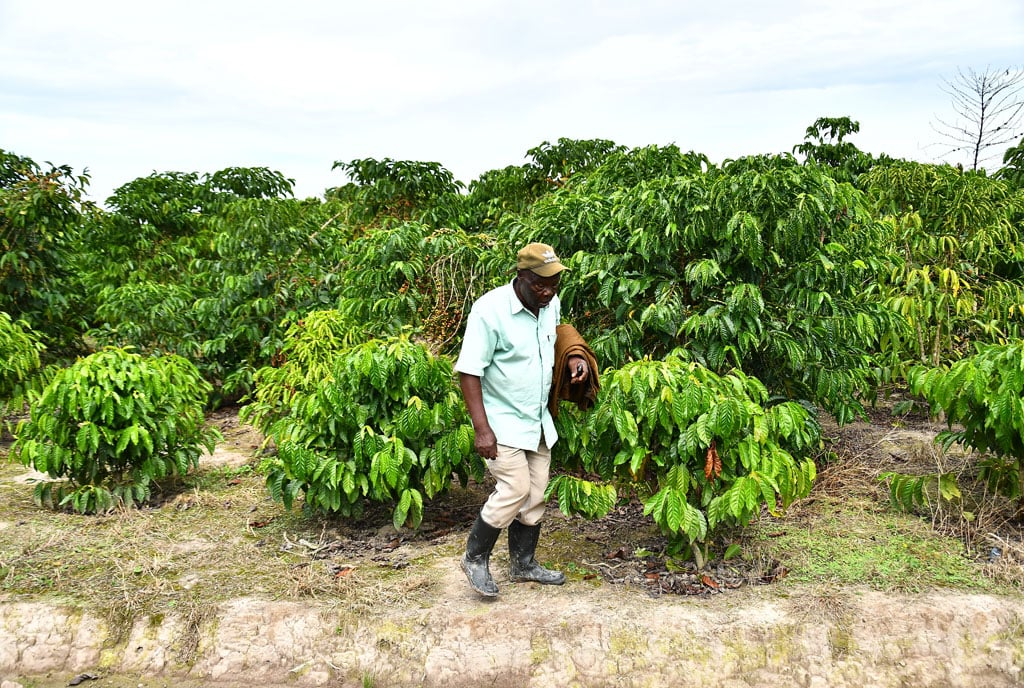EU regulation; an opportunity for farmers and the environment

A coffee farmer is seen in his garden in Kyotera District on May 20, 2024. PHOTO/MICHEAL KAKUMIRIZI
What you need to know:
- Uganda is experiencing alarming levels of deforestation, with the loss of around 2,000 square kilometres of forest annually, caused primarily by agricultural expansion, logging, and charcoal production.
In recent years, environmental sustainability has increasingly become a focal point in global trade, particularly for agricultural products, with Uganda, a nation rich in biodiversity, culture and above all, agriculture that employs over 70 percent of the population.
However, for the last decade, Uganda, one of the largest agricultural-dependents globally, comprising a significant portion of its exports, has been facing pressing environmental challenges, particularly deforestation, which threatens the sustainability of its agricultural practices.
The European Union Deforestation Regulation (EUDR) of 2023 presents a critical opportunity to address these challenges while promoting economic viability for smallholder farmers, however, the deadline for compliance is fast approaching and has created tension for smallholder farmers, particularly those in the coffee, cattle, cocoa, palm oil, soy, timber and rubber sectors, as well as those dealing in production of their derived products such as beef, furniture and chocolate among others.
Uganda is experiencing alarming levels of deforestation, with the loss of around 2,000 square kilometres of forest annually, caused primarily by agricultural expansion, logging, and charcoal production.
The EUDR, enacted in 2023, aims to ensure that goods imported into the European Union market, including coffee, cocoa, rubber, palm oil, and many more products are not associated with deforestation or forest degradation, and therefore, requires farmers to provide documentation proving that their coffee is sourced from land free of deforestation.
This regulation presents a unique opportunity for Uganda to curb its deforestation rates and enhance the long-term viability of its agricultural sector. The economic benefits of adhering to the EUDR are substantial, especially for Uganda’s farmers.
Recent statistics from the 2023 World Bank Report indicate that Uganda’s coffee exports generated over $1.4 billion in 2022, representing a remarkable increase from previous years. This revenue is crucial in lifting thousands of households out of poverty, as it provides necessary income for food security, education, and healthcare.
Besides, as international consumers increasingly prefer sustainably sourced products, Uganda’s agricultural products may command higher prices when marketed as environmentally friendly.
Complying with the stricter environmental standards set by the regulation will not only enhance Uganda’s competitive edge in the global market but also boost transparency, which is crucial for compliance verification.
Amidst ongoing corruption scandals in Uganda's coffee sector, the impending deadline for the EUDR adds further pressure on the need to address governance issues in the sector. In this case, the Ugandan government has given the Uganda Coffee Development Authority (UCDA) only 3 years to rationalise its operations as part of a broader parastatal reform effort to promote sustainable coffee farming, which could jeopardise Uganda's coffee exports to the lucrative EU market in case of failure.
Although adherence to the EUDR could unlock better prices for ethically sourced products, smallholder farmers like those from Busoga region are facing challenges in terms of compliance as they have not been adequately sensitised about the new regulation which cannot be overlooked, and require measures necessary to help these farmers adapt to these new requirements without compromising their economic viability or the environment.
These farmers, who typically operate on small plots of land, are more vulnerable than their larger counterparts who subscribe to Cooperatives. The EUDR presents both challenges and opportunities, meanwhile, in the face of a strict deadline, the urgency for action is clear.
The balance between economic viability and environmental sustainability is delicate but achievable if all parties including farmers, government, civil society and consumers work collaboratively towards a shared goal of sustainable agriculture.
Ms Patience Mutonyi, Advocacy Officer at Citizens’ Concern Africa



